外研(新标准)版七年级下Module 9 Life history知识点讲解课件(38张ppt)
文档属性
| 名称 | 外研(新标准)版七年级下Module 9 Life history知识点讲解课件(38张ppt) | 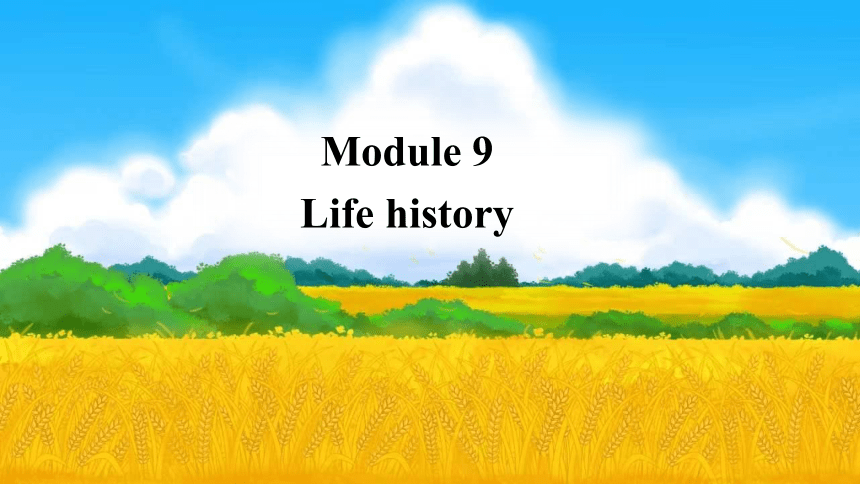 | |
| 格式 | pptx | ||
| 文件大小 | 341.6KB | ||
| 资源类型 | 教案 | ||
| 版本资源 | 外研版 | ||
| 科目 | 英语 | ||
| 更新时间 | 2022-01-15 21:34:42 | ||
图片预览

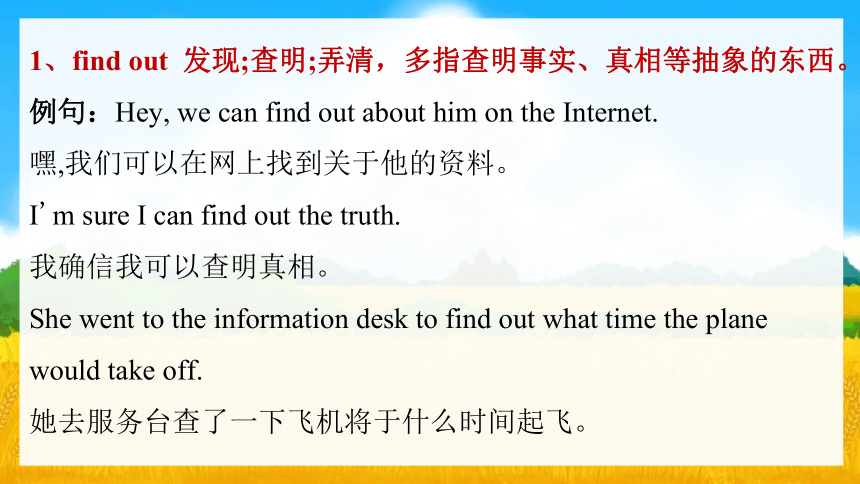
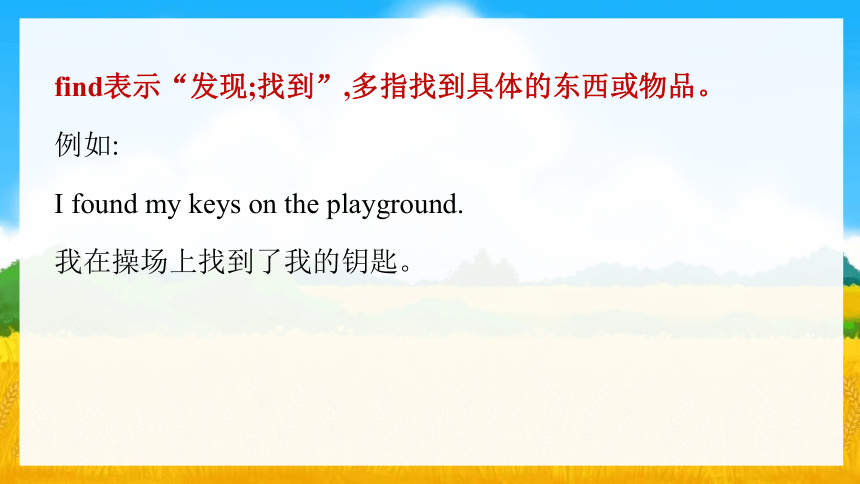
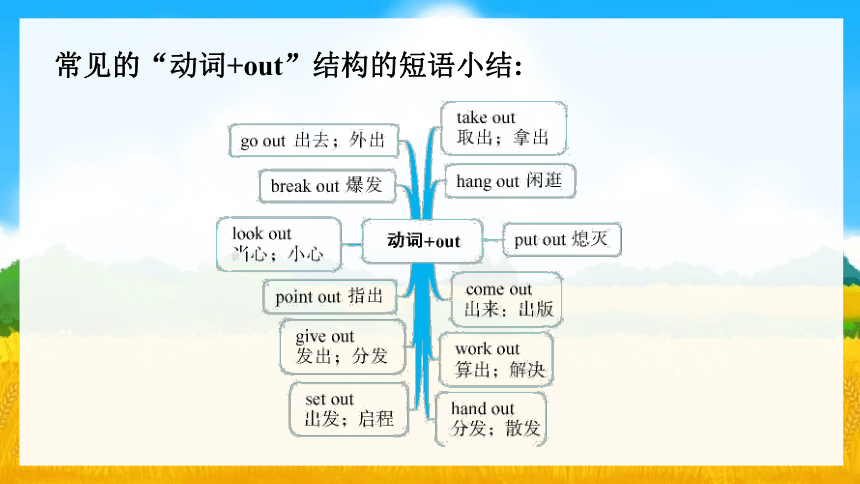
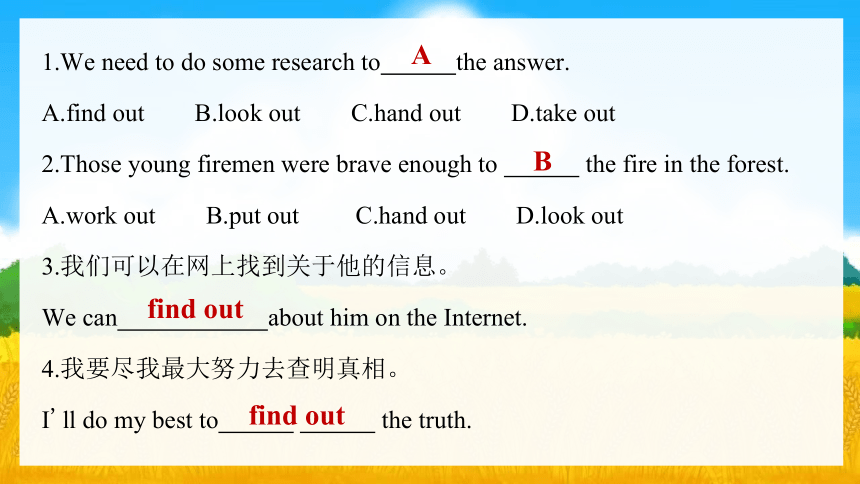
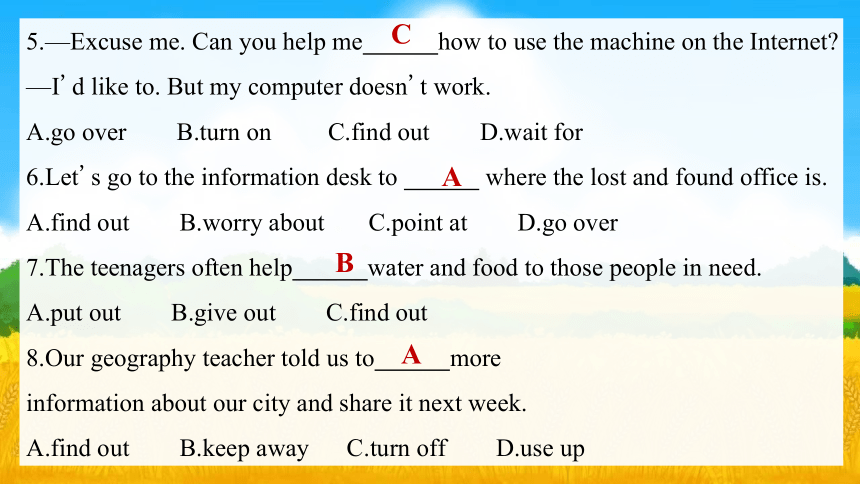
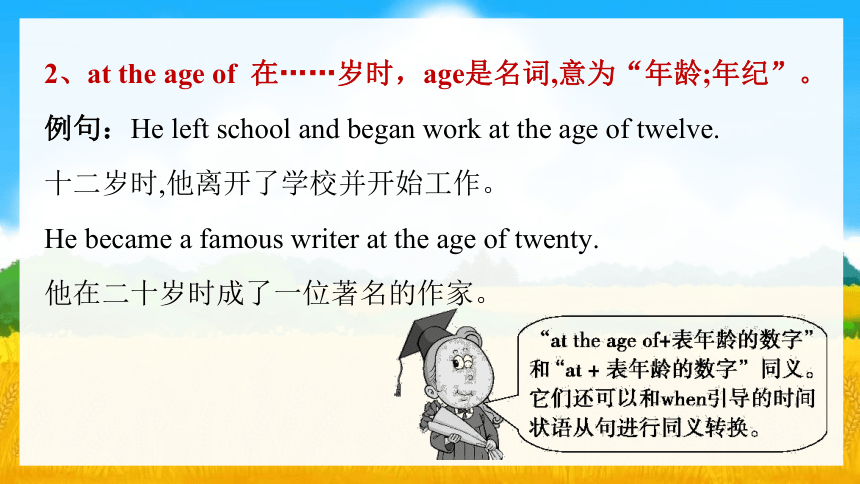
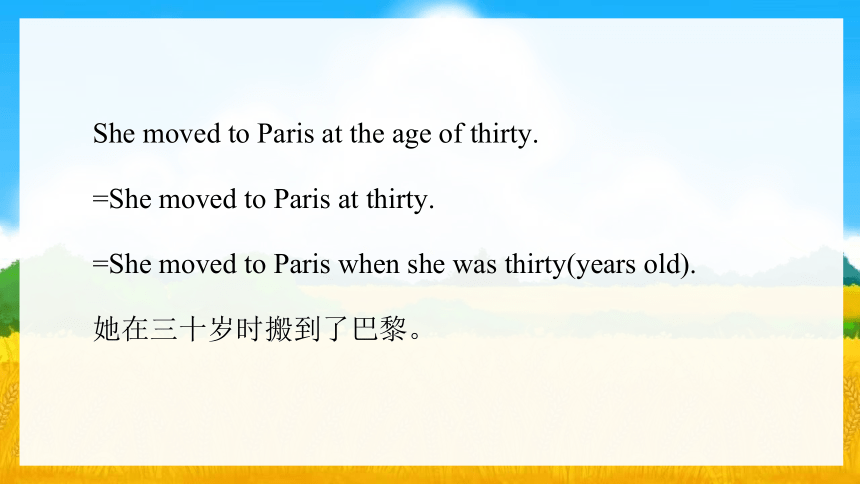
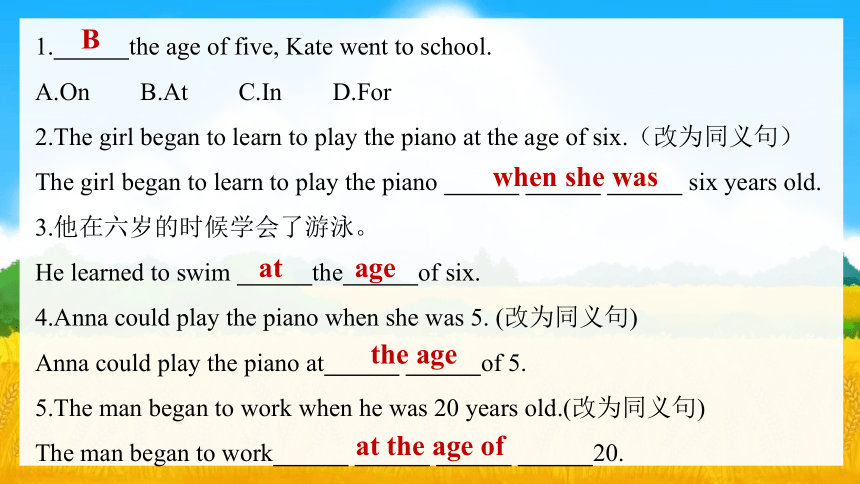
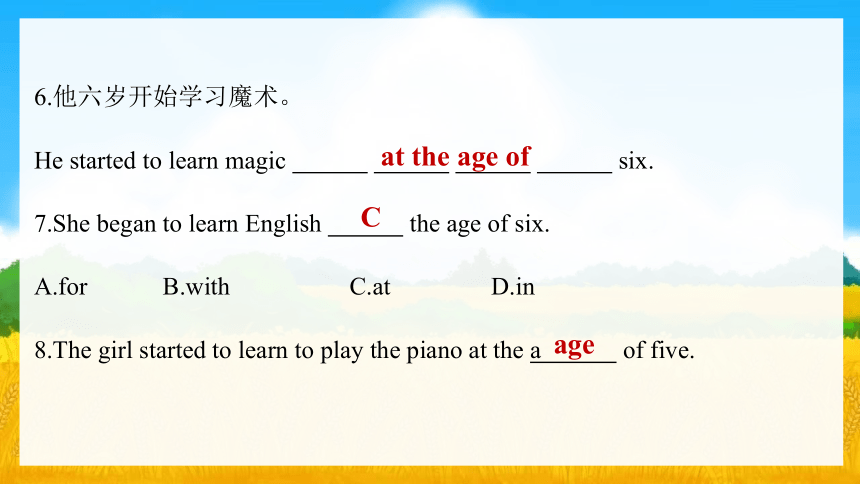
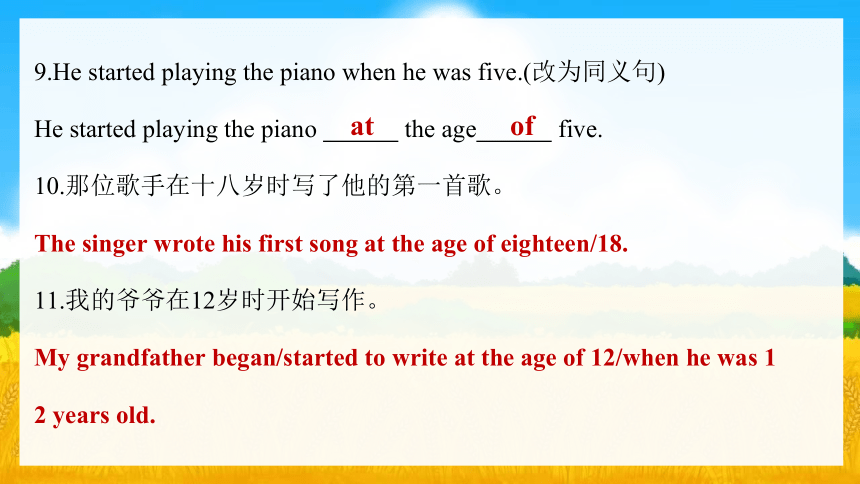
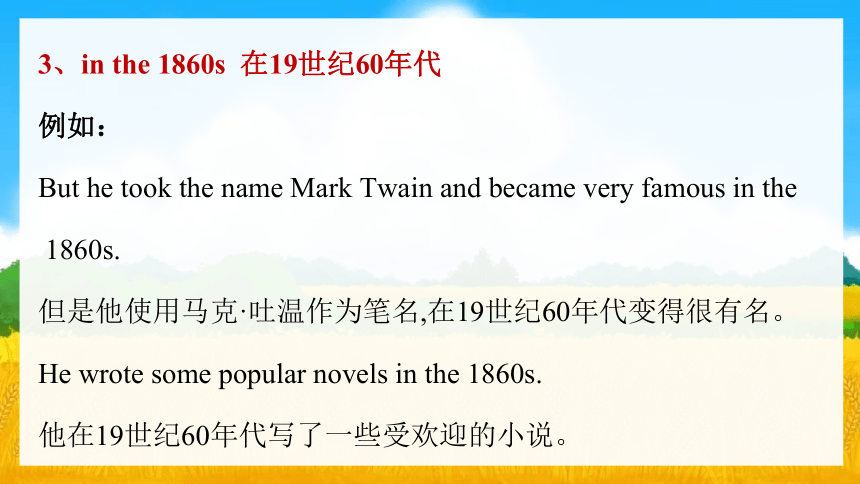
文档简介
(共38张PPT)
Module 9
Life history
1、find out 发现;查明;弄清,多指查明事实、真相等抽象的东西。
例句:Hey, we can find out about him on the Internet.
嘿,我们可以在网上找到关于他的资料。
I'm sure I can find out the truth.
我确信我可以查明真相。
She went to the information desk to find out what time the plane
would take off.
她去服务台查了一下飞机将于什么时间起飞。
find表示“发现;找到”,多指找到具体的东西或物品。
例如:
I found my keys on the playground.
我在操场上找到了我的钥匙。
常见的“动词+out”结构的短语小结:
1.We need to do some research to the answer.
A.find out B.look out C.hand out D.take out
2.Those young firemen were brave enough to the fire in the forest.
A.work out B.put out C.hand out D.look out
3.我们可以在网上找到关于他的信息。
We can about him on the Internet.
4.我要尽我最大努力去查明真相。
I'll do my best to the truth.
A
B
find out
find out
5.—Excuse me. Can you help me how to use the machine on the Internet
—I'd like to. But my computer doesn't work.
A.go over B.turn on C.find out D.wait for
6.Let's go to the information desk to where the lost and found office is.
A.find out B.worry about C.point at D.go over
7.The teenagers often help water and food to those people in need.
A.put out B.give out C.find out
8.Our geography teacher told us to more
information about our city and share it next week.
A.find out B.keep away C.turn off D.use up
C
A
B
A
2、at the age of 在……岁时,age是名词,意为“年龄;年纪”。
例句:He left school and began work at the age of twelve.
十二岁时,他离开了学校并开始工作。
He became a famous writer at the age of twenty.
他在二十岁时成了一位著名的作家。
She moved to Paris at the age of thirty.
=She moved to Paris at thirty.
=She moved to Paris when she was thirty(years old).
她在三十岁时搬到了巴黎。
1. the age of five, Kate went to school.
A.On B.At C.In D.For
2.The girl began to learn to play the piano at the age of six.(改为同义句)
The girl began to learn to play the piano six years old.
3.他在六岁的时候学会了游泳。
He learned to swim the of six.
4.Anna could play the piano when she was 5. (改为同义句)
Anna could play the piano at of 5.
5.The man began to work when he was 20 years old.(改为同义句)
The man began to work 20.
B
when she was
at age
the age
at the age of
6.他六岁开始学习魔术。
He started to learn magic six.
7.She began to learn English the age of six.
A.for B.with C.at D.in
8.The girl started to learn to play the piano at the a of five.
C
at the age of
age
9.He started playing the piano when he was five.(改为同义句)
He started playing the piano the age five.
10.那位歌手在十八岁时写了他的第一首歌。
The singer wrote his first song at the age of eighteen/18.
11.我的爷爷在12岁时开始写作。
My grandfather began/started to write at the age of 12/when he was 1
2 years old.
at of
3、in the 1860s 在19世纪60年代
例如:
But he took the name Mark Twain and became very famous in the
1860s.
但是他使用马克·吐温作为笔名,在19世纪60年代变得很有名。
He wrote some popular novels in the 1860s.
他在19世纪60年代写了一些受欢迎的小说。
1.他在20世纪30年代变得很有名气。
He became famous .
2.Mark Twain became very famous .
A.in the 1980 B.in 1980s
C.in the 1980s' D.in the 1980s
3.这首歌曲在20世纪90年代非常有名。
This song was very famous the .
D
in the 1930s
in 1990s
4.他在十九世纪六十年代变得很有名气。
He became very famous in the 1860s.
5.他在20世纪80年代变得很有名气。
He became very famous in the 1980s.
4、marry 动词,意为“结婚”,
既可以作及物动词,也可以作不及物动词。
例句:
He married in 1582 and had three children.
他在1582年结的婚,并有3个孩子。
Will you marry me 你愿意同我结婚吗
He did not marry until he was thirty.他到三十岁才结婚。
get married 结婚
be/get married to sb.=marry sb.和某人结婚
派生词:married adj. 结婚的;已婚的
注意 marry是短暂性动词,不能和时间段连用。若表示“结婚多长时间”要用be married。
例如:They have been married for five years.他们结婚五年了。
=They got married five years ago.他们五年前结的婚。
1.Michelle Barack, and they've got two daughters called
Malia and Sasha.
A.marries to B.is married to
C.marries with D.is married with
2.My aunt and her husband got (marry)last year.
3.Mary and her husband for ten years.
A.have been married B.married
C.got married D.have married
4.My grandparents for over 60 years and they love each other very much.
A.have been married B.got married
C.were married D.have got married
B
A
A
married
5.His parents for about fifteen years.Now they have three children.
A.married B.have married
C.got married D.have been married
6.She to an engineer for 15 years.
A.married B.got married
C.has been married D.has got married
7.他们打算明年结婚。
They are going to next year.
D
C
get married
5、successful 形容词,意为“成功的”,可以修饰人,也可以修饰事或物。
例句:He became a successful actor and began to write plays.
他成了一名成功的演员,并开始写剧本。
My uncle is a successful businessman.
我的叔叔是一位成功的商人。
His latest movie is very successful.
他最新的那部电影很成功。
succeed v.成功
success n.成功;成功的人或事物
successfully adv.成功地
1.The road to (succeed) is to work honestly.
2.Never give up and you will be (成功的).
3.Chang'e 4 has landed (success) on the
far side of the moon on January 3, 2019.
4.( hope your new product will be very (success).
5.After they kept working for years, they were s (成功的)at last.
success
successful
successfully
successful
successful
6.You need not only talent but also hard work to become
a football player.
A.young B.successful C.happy D.friendly
7.We all think it is a movie.All of us want to see it again.
A.boring B.lazy C.silly D.successful
8.We were excited because we climbed up to the top of the mountain
(success).
B
D
successfully
9.Frederick entered the final competition last month.
His hobby has brought him .
A.successful;success B.successful;successfully
C.successfully;success D.successfully;successful
10.这是一部很成功的电影,我们都想再看一遍。
This is a successful movie and we all want to watch it again.
C
6、辨析:die, dead, death
注意 表示“去世多长时间”不能用die,而应该用延续性的be dead。
die 动词,意为“死;去世”,是短暂性动词,不能和时间段连用。
如:Shakespeare died in 1616.
莎士比亚于1616年去世。
dead 形容词,意为“死的;去世的”,可以作表语,也可以作定语。
如:The old man has been dead for five years.
那位老人已经去世五年了。
death 名词,意为“死;死亡;去世”。
如:He felt sad about his grandma's death.
他为他的奶奶的去世感到难过。
1.The famous star has (die)for nearly 15 years.
2.My grandmother d (去世)last year.
3.My grandfather's (die)made me very sad.
been dead
died
death
7、一般过去时(3)
在英语中,许多动词的过去式是不规则变化的。这些动词的过去式需要特殊记忆。常见的变化规律有:
<1>把动词原形中的o变为a。
例如:become—became come—came
<2>把动词原形中的e变为o。
例如:get—got forget—forgot
<3>把动词原形中的-eep变为-ept。
例如:keep—kept sleep—slept
<4>把动词原形中的i变为a。
例如:begin—began drink—drank
give—gave sing—sang
sit—sat swim—swam
<5>把动词原形中的i变为o。
例如:drive—drove ride—rode
win—won write—wrote
<6>把动词原形中的an变为oo。
例如:stand—stood understand—understood
<7>把动词原形中的-aw或-ow变为-ew。
例如:draw—drew grow—grew
know—knew throw—threw
<8>把动词原形中的-eak变为-oke。
例如:break—broke speak—spoke
<9>把动词原形中的-ell变为-old。
例如:sell—sold tell—told
<10>在动词原形后加-d或-t。
例如:hear—heard mean—meant
<11>动词的过去式与动词原形一样。
例如:cut—cut hurt—hurt
let—let put—put
read—read set—set
<12>有些动词的过去式有两种形式。
例如:dream—dreamed/dreamt
learn—learnt/learned
<13>其他。
例如:say—said build—built eat—ate fall—fell feel—felt find—found fly—flew go—went have—had hide—hid hold—held lay—laid
leave—left lose—lost make—made run—ran see—saw take—took wear—wore
1.He worked hard. In the end, he (成为) a successful manager.
2.—Jack, you look more handsome in your new shirt today.
—Oh, really I it in a cheap store with my mom.
A.buy B.will buy C.bought
3.— did he do last night
—He went to the concert with his friends.
A.What B.How C.When D.Where
4.They don't live here any longer. They to Chengdu last month.
A.move B.moved
C.will move D.are moving
C
A
B
became
5.The singer (become)popular when he was twenty years old.
6.Nick always had a picnic after he (swim) in the river.
7.I (meet)my first teacher on my way home yesterday.
8.The man joined the army.(改为否定句)
The man the army.
9.He started to learn to swim.(改为一般疑问句)
he to learn to swim
became
swam
met
didn't join
Did start
10.She became famous two years ago.(对画线部分提问)
she famous
11.—The bread is really delicious.
—Thank you. I it myself.
A.make B.made C.will make D.am making
12.Yu Qiuyu us a wonderful speech in Guangyuan last month.We all
learned a lot from it.
A.gives B.give C.gave
13.Her father bought a new bike for her. (改为否定句)
Her father a new bike for her.
B
C
When did become
didn't buy
14.They were born in Shandong.(对画线部分提问)
were they born
15.Betty walked to school yesterday morning.
(改为一般疑问句并作肯定回答)
— Betty to school yesterday morning
—Yes, she .
16.We traveled by train.(对画线部分提问)
you travel
17.他使用马克·吐温这一名字并开始写小说。
He Mark Twain and began to write novels.
Where
Did walk
did
How did
took the name
18.去年他变得很有名了。
He last year.
19.He joined the army two years ago.(对画线部分提问)
he the army
20.We spent five hours reading this book yesterday.(改为同义句)
us five hours this book yesterday.
21.They went to the supermarket last night.(改为一般疑问句)
to the supermarket last night
became very famous
When did join
It took to read
Did they go
22.The writer became famous in the 1980s.(对画线部分提问)
the writer famous
23.—You look tired. What's wrong with you
—I well last night.
A.won't sleep B.don't sleep C.didn't sleep
24.他是什么时候搬到伦敦去住的
When did he move to London
C
When did become
25.昨天我没有和他一起去看电影。
I didn't watch the movie with him yesterday.
26.上周他是怎样去北京的
How did he get to Beijing last week
27.—There is someone knocking at the door.
—It must be the computer repairman. I him to come to fix my computer.
A.call B.have called C.called D.will call
C
28.Mary her homework, but Mike did.
A.didn't do B.doesn't do C.won't do D.isn't doing
29.—Jerry, have you ever been to the Great Wall
—Yes. I there with my parents last year.
A.go B.went C.will go D.have gone
30.—She to visit her grandpa with her parents.
A.went B.goes C.will go D.is going
A
B
A
Module 9
Life history
1、find out 发现;查明;弄清,多指查明事实、真相等抽象的东西。
例句:Hey, we can find out about him on the Internet.
嘿,我们可以在网上找到关于他的资料。
I'm sure I can find out the truth.
我确信我可以查明真相。
She went to the information desk to find out what time the plane
would take off.
她去服务台查了一下飞机将于什么时间起飞。
find表示“发现;找到”,多指找到具体的东西或物品。
例如:
I found my keys on the playground.
我在操场上找到了我的钥匙。
常见的“动词+out”结构的短语小结:
1.We need to do some research to the answer.
A.find out B.look out C.hand out D.take out
2.Those young firemen were brave enough to the fire in the forest.
A.work out B.put out C.hand out D.look out
3.我们可以在网上找到关于他的信息。
We can about him on the Internet.
4.我要尽我最大努力去查明真相。
I'll do my best to the truth.
A
B
find out
find out
5.—Excuse me. Can you help me how to use the machine on the Internet
—I'd like to. But my computer doesn't work.
A.go over B.turn on C.find out D.wait for
6.Let's go to the information desk to where the lost and found office is.
A.find out B.worry about C.point at D.go over
7.The teenagers often help water and food to those people in need.
A.put out B.give out C.find out
8.Our geography teacher told us to more
information about our city and share it next week.
A.find out B.keep away C.turn off D.use up
C
A
B
A
2、at the age of 在……岁时,age是名词,意为“年龄;年纪”。
例句:He left school and began work at the age of twelve.
十二岁时,他离开了学校并开始工作。
He became a famous writer at the age of twenty.
他在二十岁时成了一位著名的作家。
She moved to Paris at the age of thirty.
=She moved to Paris at thirty.
=She moved to Paris when she was thirty(years old).
她在三十岁时搬到了巴黎。
1. the age of five, Kate went to school.
A.On B.At C.In D.For
2.The girl began to learn to play the piano at the age of six.(改为同义句)
The girl began to learn to play the piano six years old.
3.他在六岁的时候学会了游泳。
He learned to swim the of six.
4.Anna could play the piano when she was 5. (改为同义句)
Anna could play the piano at of 5.
5.The man began to work when he was 20 years old.(改为同义句)
The man began to work 20.
B
when she was
at age
the age
at the age of
6.他六岁开始学习魔术。
He started to learn magic six.
7.She began to learn English the age of six.
A.for B.with C.at D.in
8.The girl started to learn to play the piano at the a of five.
C
at the age of
age
9.He started playing the piano when he was five.(改为同义句)
He started playing the piano the age five.
10.那位歌手在十八岁时写了他的第一首歌。
The singer wrote his first song at the age of eighteen/18.
11.我的爷爷在12岁时开始写作。
My grandfather began/started to write at the age of 12/when he was 1
2 years old.
at of
3、in the 1860s 在19世纪60年代
例如:
But he took the name Mark Twain and became very famous in the
1860s.
但是他使用马克·吐温作为笔名,在19世纪60年代变得很有名。
He wrote some popular novels in the 1860s.
他在19世纪60年代写了一些受欢迎的小说。
1.他在20世纪30年代变得很有名气。
He became famous .
2.Mark Twain became very famous .
A.in the 1980 B.in 1980s
C.in the 1980s' D.in the 1980s
3.这首歌曲在20世纪90年代非常有名。
This song was very famous the .
D
in the 1930s
in 1990s
4.他在十九世纪六十年代变得很有名气。
He became very famous in the 1860s.
5.他在20世纪80年代变得很有名气。
He became very famous in the 1980s.
4、marry 动词,意为“结婚”,
既可以作及物动词,也可以作不及物动词。
例句:
He married in 1582 and had three children.
他在1582年结的婚,并有3个孩子。
Will you marry me 你愿意同我结婚吗
He did not marry until he was thirty.他到三十岁才结婚。
get married 结婚
be/get married to sb.=marry sb.和某人结婚
派生词:married adj. 结婚的;已婚的
注意 marry是短暂性动词,不能和时间段连用。若表示“结婚多长时间”要用be married。
例如:They have been married for five years.他们结婚五年了。
=They got married five years ago.他们五年前结的婚。
1.Michelle Barack, and they've got two daughters called
Malia and Sasha.
A.marries to B.is married to
C.marries with D.is married with
2.My aunt and her husband got (marry)last year.
3.Mary and her husband for ten years.
A.have been married B.married
C.got married D.have married
4.My grandparents for over 60 years and they love each other very much.
A.have been married B.got married
C.were married D.have got married
B
A
A
married
5.His parents for about fifteen years.Now they have three children.
A.married B.have married
C.got married D.have been married
6.She to an engineer for 15 years.
A.married B.got married
C.has been married D.has got married
7.他们打算明年结婚。
They are going to next year.
D
C
get married
5、successful 形容词,意为“成功的”,可以修饰人,也可以修饰事或物。
例句:He became a successful actor and began to write plays.
他成了一名成功的演员,并开始写剧本。
My uncle is a successful businessman.
我的叔叔是一位成功的商人。
His latest movie is very successful.
他最新的那部电影很成功。
succeed v.成功
success n.成功;成功的人或事物
successfully adv.成功地
1.The road to (succeed) is to work honestly.
2.Never give up and you will be (成功的).
3.Chang'e 4 has landed (success) on the
far side of the moon on January 3, 2019.
4.( hope your new product will be very (success).
5.After they kept working for years, they were s (成功的)at last.
success
successful
successfully
successful
successful
6.You need not only talent but also hard work to become
a football player.
A.young B.successful C.happy D.friendly
7.We all think it is a movie.All of us want to see it again.
A.boring B.lazy C.silly D.successful
8.We were excited because we climbed up to the top of the mountain
(success).
B
D
successfully
9.Frederick entered the final competition last month.
His hobby has brought him .
A.successful;success B.successful;successfully
C.successfully;success D.successfully;successful
10.这是一部很成功的电影,我们都想再看一遍。
This is a successful movie and we all want to watch it again.
C
6、辨析:die, dead, death
注意 表示“去世多长时间”不能用die,而应该用延续性的be dead。
die 动词,意为“死;去世”,是短暂性动词,不能和时间段连用。
如:Shakespeare died in 1616.
莎士比亚于1616年去世。
dead 形容词,意为“死的;去世的”,可以作表语,也可以作定语。
如:The old man has been dead for five years.
那位老人已经去世五年了。
death 名词,意为“死;死亡;去世”。
如:He felt sad about his grandma's death.
他为他的奶奶的去世感到难过。
1.The famous star has (die)for nearly 15 years.
2.My grandmother d (去世)last year.
3.My grandfather's (die)made me very sad.
been dead
died
death
7、一般过去时(3)
在英语中,许多动词的过去式是不规则变化的。这些动词的过去式需要特殊记忆。常见的变化规律有:
<1>把动词原形中的o变为a。
例如:become—became come—came
<2>把动词原形中的e变为o。
例如:get—got forget—forgot
<3>把动词原形中的-eep变为-ept。
例如:keep—kept sleep—slept
<4>把动词原形中的i变为a。
例如:begin—began drink—drank
give—gave sing—sang
sit—sat swim—swam
<5>把动词原形中的i变为o。
例如:drive—drove ride—rode
win—won write—wrote
<6>把动词原形中的an变为oo。
例如:stand—stood understand—understood
<7>把动词原形中的-aw或-ow变为-ew。
例如:draw—drew grow—grew
know—knew throw—threw
<8>把动词原形中的-eak变为-oke。
例如:break—broke speak—spoke
<9>把动词原形中的-ell变为-old。
例如:sell—sold tell—told
<10>在动词原形后加-d或-t。
例如:hear—heard mean—meant
<11>动词的过去式与动词原形一样。
例如:cut—cut hurt—hurt
let—let put—put
read—read set—set
<12>有些动词的过去式有两种形式。
例如:dream—dreamed/dreamt
learn—learnt/learned
<13>其他。
例如:say—said build—built eat—ate fall—fell feel—felt find—found fly—flew go—went have—had hide—hid hold—held lay—laid
leave—left lose—lost make—made run—ran see—saw take—took wear—wore
1.He worked hard. In the end, he (成为) a successful manager.
2.—Jack, you look more handsome in your new shirt today.
—Oh, really I it in a cheap store with my mom.
A.buy B.will buy C.bought
3.— did he do last night
—He went to the concert with his friends.
A.What B.How C.When D.Where
4.They don't live here any longer. They to Chengdu last month.
A.move B.moved
C.will move D.are moving
C
A
B
became
5.The singer (become)popular when he was twenty years old.
6.Nick always had a picnic after he (swim) in the river.
7.I (meet)my first teacher on my way home yesterday.
8.The man joined the army.(改为否定句)
The man the army.
9.He started to learn to swim.(改为一般疑问句)
he to learn to swim
became
swam
met
didn't join
Did start
10.She became famous two years ago.(对画线部分提问)
she famous
11.—The bread is really delicious.
—Thank you. I it myself.
A.make B.made C.will make D.am making
12.Yu Qiuyu us a wonderful speech in Guangyuan last month.We all
learned a lot from it.
A.gives B.give C.gave
13.Her father bought a new bike for her. (改为否定句)
Her father a new bike for her.
B
C
When did become
didn't buy
14.They were born in Shandong.(对画线部分提问)
were they born
15.Betty walked to school yesterday morning.
(改为一般疑问句并作肯定回答)
— Betty to school yesterday morning
—Yes, she .
16.We traveled by train.(对画线部分提问)
you travel
17.他使用马克·吐温这一名字并开始写小说。
He Mark Twain and began to write novels.
Where
Did walk
did
How did
took the name
18.去年他变得很有名了。
He last year.
19.He joined the army two years ago.(对画线部分提问)
he the army
20.We spent five hours reading this book yesterday.(改为同义句)
us five hours this book yesterday.
21.They went to the supermarket last night.(改为一般疑问句)
to the supermarket last night
became very famous
When did join
It took to read
Did they go
22.The writer became famous in the 1980s.(对画线部分提问)
the writer famous
23.—You look tired. What's wrong with you
—I well last night.
A.won't sleep B.don't sleep C.didn't sleep
24.他是什么时候搬到伦敦去住的
When did he move to London
C
When did become
25.昨天我没有和他一起去看电影。
I didn't watch the movie with him yesterday.
26.上周他是怎样去北京的
How did he get to Beijing last week
27.—There is someone knocking at the door.
—It must be the computer repairman. I him to come to fix my computer.
A.call B.have called C.called D.will call
C
28.Mary her homework, but Mike did.
A.didn't do B.doesn't do C.won't do D.isn't doing
29.—Jerry, have you ever been to the Great Wall
—Yes. I there with my parents last year.
A.go B.went C.will go D.have gone
30.—She to visit her grandpa with her parents.
A.went B.goes C.will go D.is going
A
B
A
同课章节目录
- Module 1 Lost and found
- Unit 1 Whose bag is this?
- Unit 2 Are they yours?
- Unit 3 Language in use
- Module 2 What can you do ?
- Unit 1 I can play the piano
- Unit 2 I can run really fast
- Unit 3 Language in use
- Module 3 Making plans
- Unit 1 What are you going to do at the weekends?
- Unit 2 We're going to cheer the players.
- Unit 3 Language in use
- Module 4 Life in the future
- Unit 1 Everyone will study at home
- Unit 2 Every family will have a small plane.
- Unit 3 Language in use
- Module 5 Shopping
- Unit 1 What can I do for you?
- Unit 2 You can buy everything on the Internet
- Unit 3 Language in use
- Module 6 Around town
- Unit 1 Could you tell me how to get to the Nationa
- Unit 2 The London Eye is on your right.
- Unit 3 Language in use
- Revision module A
- Module 7 My past life
- Unit 1 I was born in a small village.
- Unit 2 I was born in Quincy.
- Unit 3 Language in use
- Module 8 Story time
- Unit 1 Once upon a time….
- Unit 2 Goldilocks hurried out of the house.
- Unit 3 Language in use
- Module 9 Life history
- Unit 1 He left school and began work at the age of
- Unit 2 He decided to be an actor.
- Unit 3 Language in use
- Module 10 A holiday journey
- Unit 1 What did you do?
- Unit 2 This morning we took a walk.
- Unit 3 Language in use
- Module 11 Body language
- Unit 1 They touch noses!
- Unit 2 Here are some ways to welcome them.
- Unit 3 Language in use
- Module 12 Western music
- Unit 1 It's so beautiful!
- Unit 2 Vienna is the centre of European classical
- Unit 3 Language in use
- Revision module B
